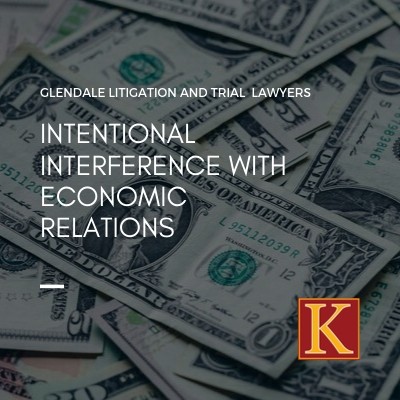Intentional interference with economic relations is an unfair business practice in California which includes three types of actions:
- Intentional interference with contractual relations
- Intentional interference with prospective economic advantage
- Negligent interference with prospective economic advantage
Intentional Interference with Contractual Relations
Elements of a claim for intentional interference with contractual relations
According to CACI 2201, the plaintiff must be able to prove the following elements to establish the claim:
- There was a valid contract between the plaintiff and a third party;
- Defendant knew about the contract
- By engaging in this conduct the defendant had the intention to disrupt the relationship or knew that disruption of the relationship was substantially certain to occur
- The relationship was disrupted
- The plaintiff was harmed as the result of the defendant’s conduct
The claim of intentional interference with contractual relations requires the existence of an underlying enforceable contract. In case there is no contract or the contract is unenforceable, then the plaintiff will have a claim for interference with prospective economic advantage.
Intentional Interference with Prospective Economic Advantage
Elements of a claim for interference with prospective economic advantage
According to CACI 2202, The plaintiff must be able to prove the following elements to establish the claim:
- The plaintiff and a third party were in an economic relationship that probably would have resulted in an economic benefit to him
- Defendant knew about the relationship
- Defendant engaged in a wrongful conduct
- By engaging in this conduct defendant intended to disrupt the relationship or knew that the disruption was substantially certain to occur
- The relationship was disrupted
- The plaintiff was harmed as the result of the defendant’s conduct
Though generally, a claim for intentional interference with prospective economic advantage includes the defendant’s interference with a prospective contract, liability can be based on interference with any economic relationship containing a probability of future benefits to the plaintiff, including interference with any lawful trade, business, or occupation. Some common examples of intentional interference with prospective economic advantage include conduct constituting libel fraud, or misappropriation of trade secrets.
Negligent Interference with Prospective Economic Advantage
Elements of a claim for negligent interference with prospective economic advantage
According to CACI 2204, the plaintiff must be able to prove the following elements to establish the claim:
- The plaintiff and a third party were in an economic relationship that probably would have resulted in an economic benefit to him
- Defendant knew about the relationship and was aware or should have been aware that in case he didn’t act with due care his actions would interfere with the relationship
- Defendant was negligent and failed to act with reasonable care
- The relationship was disrupted
- The plaintiff was harmed as the result of the defendant’s conduct
Damages a Plaintiff Can Recover When Bringing a Successful Claim Against the Defendant
Damages for interference with economic relations can include recovery for all resulting harm, including expenses, damage to business reputation, mental distress. The victim can also recover punitive damages in case the defendant acted with fraud, malice, or oppression.

